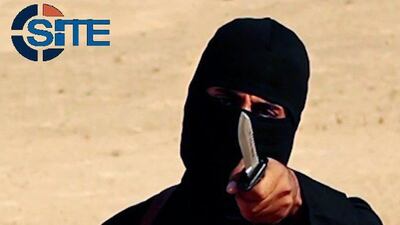A diplomatic tussle has begun regarding the fate of two British Isil fighters captured in Syria last week.
It was revealed on Thursday that Elshafee Elsheikh and Alexanda Kotey, two remaining members of a notorious group responsible for executing western hostages and known as The Beatles, had been captured.
Neither had appeared in propaganda videos like fellow beatle Mohammed Emwazi, and their fate was unknown. They had been captured almost a month ago, and a security official said they had been a” treasure trove” of intelligence.
The two men were allegedly captured in a village near Raqqa, attempting to smuggle themselves into Turkey. The National revealed earlier this week that Isil fighters were paying thousands of dollars to SDF and FSA fighters to smuggle themselves across Syria and into Turkey.
This eastern part of Syria is home to remains of Isil’s openly held territory, in particular Wilayat Barakah. The region has also maintained a high level of propaganda output – earlier this week the group released a notable video which showed niqab-clad women fighting on the frontline – something not seen before within Isil.
Almost immediately, as news of the capture broke, discussion turned to what might become of the two men. Nicholas Henin, a French journalist who was among the 27 held, but was eventually released, said: "This is the beginning of a process that will bring them eventually, hopefully, to a trial. Justice is just what I want."
On the possibility that the two, who are currently under the jurisdiction of US authorities in Syria, might be transferred to Guantanamo Bay prison in Cuba, which US President Donald Trump signed to keep open late last month, Mr Henin warned: "Guantanamo is a denial of justice. Guantanamo was opened 16 years ago. There hasn't been a single trial there.
"What I want is a trial and a trial potentially that I can attend, so rather, a trial in London rather than one in Kobani in northern Syria,” added Mr Henin.
UK Defence Minister Tobias Elwood also warned against them being sent to Guantanamo, suggesting they be tried in an international war crimes court instead.
Bethany Haynes, daughter of British aid worker David Haines who was also killed by the group, wrote on social media: "No punishment is enough for these barbarians and in my opinion they should be sentenced to a slow painful death."
An official for the Syrian Democratic forces, the Kurdish group who captured the two men, suggested their extradition to the UK was a possibility. "There have been cases of foreigners being sent back to their home country before … and most likely the fate of these two won't be any different if the UK government approaches us", he told The Guardian.
But their legal status is unclear, and several outlets have reported that the two have been stripped of their British citizenship. The UK government had previously claimed it only took the highly-controversial measure for those with dual citizenship – but El Shafee Elsheikh is believed to have had only British citizenship – suggesting he is now a stateless individual.
Some officials suggest that the two men may have information regarding the whereabouts of John Cantlie, the British journalist kidnapped in 2012, and still held by the group. He was last seen in December 2016, when he appeared in one of the group’s propaganda videos in Mosul.
It could be that the capture of two of Britain’s most wanted individuals poses far more questions than answers.


